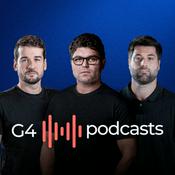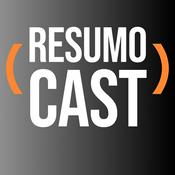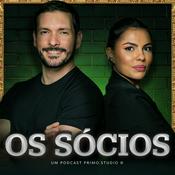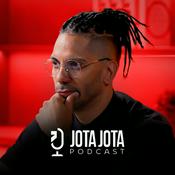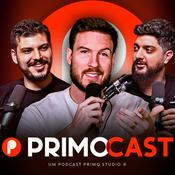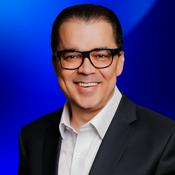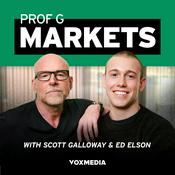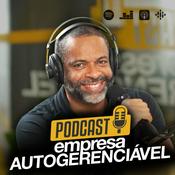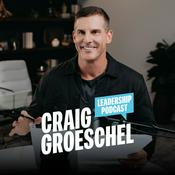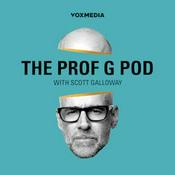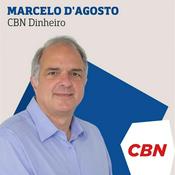105 episódios

Why Exit Thinking Destroys Value - Round Two with Paulo Passoni ( Valor Capital)
23/12/2025 | 1h 17min
At the start of the 2025 season, we released an episode that broke our Spotify records.That single conversation was listened to six times more than any other episode we released this year.That episode was my conversation with Paulo Passoni, Managing Partner at Valor Capital.For this holiday special, I invited Paulo back for round two.And this conversation goes in a very different direction.Here’s what we explore:– Why speed may be the last real moat left in the era of AI– Why Anthropic may actually be a safer bet than OpenAI– The hiring rule at Perplexity that sounds insane — until you understand what it unlocks– The 10,000-year clock Jeff Bezos is building inside a mountain, and the founder mindset behind it– **Ramp vs. CloudWalk: similar revenue scale, radically different multiples — what capital markets are actually pricing– The US vs. China, and why the Mag 7 — Alphabet, Amazon, Apple, Meta, Microsoft, Nvidia, and Tesla — now sit at the center of global power dynamics– Why LPs and capital allocators remain split on LATAM — who’s long, who’s short, and what each side is really optimizing for– And finally, what it means to be deliberately more human in the age of AI — and why hobbies and community may matter more than we thinkJoin The J Curve Community:Newsletter: Weekly deep dives into LATAM's hottest deals, emerging trends, and market intelligenceLinkedIn: Daily market insights and exclusive founder updatesInstagram: Behind-the-scenes podcast moments and quick industry takesHit subscribe and share this episode with fellow entrepreneurs and investors

Moats, Unit Economics, Retention: What Makes a Great Business - with Dileep Thazhmon (Jeeves) and Bruno Maimone (Warburg Pincus)
10/12/2025 | 48min
If you’ve spent any time with founders or investors in São Paulo this year, you know the questions filling every conversation.Can Brazil still generate breakout winners? Is AI killing SaaS? Are IPOs even realistic? Is global expansion from LATAM something founders should still aspire to?This episode answers all of them.You’ll hear why Brazil went from six $100M ARR companies to more than thirty in just a few years.Why global products that scale across Mexico and Colombia simply break in Brazil.Why AI is both the biggest threat and the biggest tailwind for incumbents with real moats.Why growth investors are underwriting M&A far more seriously than IPOs.Why “right to win” — not the story — determines whether a Brazilian company should ever go global.And what founders must understand now about valuation, exits, efficiency, and investor relationships in a world transformed by AI.And toward the end, you’ll hear me bring in the questions our audience asked live — in the room as we recorded this session.This is the episode you’ll want to send to your co-founder, your board, and the WhatsApp group where everyone is not fundraising just yet. Comment BRAZIL and I’ll send you the link to the full conversation.Dileep Thazhmon from Jeeves and Bruno Maimone from Warburg Pincus sit down with me to map the truths behind the narratives the ecosystem has been circling for months. Join The J Curve Community:Newsletter: Weekly deep dives into LATAM's hottest deals, emerging trends, and market intelligenceLinkedIn: Daily market insights and exclusive founder updatesInstagram: Behind-the-scenes podcast moments and quick industry takesHit subscribe and share this episode with fellow entrepreneurs and investors

What Money Means Is About to Change - with Roberto Dagnoni (Mercado Bitcoin), Gui Gomes (OranjeBTC) and Ben Lizana (SoftBank)
26/11/2025 | 1h 1min
This conversation will change how you think about money. Recorded live at Digital Assets Conference 2025 in São Paulo, this special edition of The J Curve brings together three influential voices shaping the next era of crypto and traditional finance:Roberto Dagnoni — Executive Chairman, Mercado BitcoinBen Lizana — Principal, SoftBank Latin AmericaGui Gomes — Founder & CEO, OranjeBTCThis is not a technical crypto panel.It’s a wide-ranging debate about the future of money, digital assets, crypto adoption, and the global transformation of financial infrastructure — told by the operators and investors building that future in real time.We discuss:• The real bottleneck to mainstream adoption — the factor slowing growth more than technology, liquidity, or regulation.• The emerging-market advantage — why Latin America’s volatility and innovation pressure are creating a global edge.• The new IPO class — why public markets are suddenly hungry for digital-asset companies and what they’re evaluating.• Lessons from the last crypto cycle — the mindset founders and investors need to navigate hype, downturns, and noise.• The future of digital money — how reserve assets, tokenization, stablecoins, and macro shifts will shape global adoption.• The everyday impact — how new financial primitives are already reducing friction in ordinary transactions.Join The J Curve Community:Newsletter: Weekly deep dives into LATAM's hottest deals, emerging trends, and market intelligenceLinkedIn: Daily market insights and exclusive founder updatesInstagram: Behind-the-scenes podcast moments and quick industry takesHit subscribe and share this episode with fellow entrepreneurs and investors

Complexity Is Your Unfair Advantage - with Olga Maslikhova (The J Curve)
12/11/2025 | 30min
We talk about complexity all the time — but few founders have weaponized it like these four did.In markets where infrastructure is fragmented, regulation changes by the month, and operational chaos is the norm, most founders either give up or try to export Silicon Valley playbooks that don't translate.Daniel Vogel, Caique Carvalho, Tiago Dalvi, and Piero Contezini did something different.They didn't build despite the complexity. They built because of it.Daniel turned Mexico's regulatory maze into Bitso's $2.2 billion moat — Latin America's first crypto unicorn. Caique orchestrated Brazil's fragmented DMV infrastructure into Gringo's $200 million exit to Corpay. Tiago called every investor to return their money, then pivoted Olist into a $10 billion GMV platform. And Piero turned Brazil's Byzantine tax system into Asaas's 37 revenue streams and a path to a U.S. listing.This isn't a recap episode. It's a strategic debrief.Every few months, I step back to look at the patterns — the decisions, frameworks, and inflection points that separate companies that scale from those that stall. This quarter, one theme cut through everything: in emerging markets, the very friction that makes these markets "too hard" is what makes them defensible once you figure them out.What I cover:The infrastructure decision — When to build from scratch vs. orchestrate what exists, and why control beats features in volatile markets.The contrarian bet that won Mexico — How Bitso ignored the entire crypto industry's narrative about replacing fiat and built the bridge instead.The tattoo marketplace that failed — What Caique learned about the difference between problems people tolerate and problems they'll pay to eliminate.The pivot that required courage — Why Tiago offered to return investor money, and what that decision revealed about founder clarity.Distribution as product design — Why Gringo built for WhatsApp first, and the three questions every founder should ask before building any feature.The four-layer playbook — How Asaas went from "help SMBs get paid" to 37 revenue streams by solving sequential, interconnected problems.The M&A playbook that just works — Olist's four-step integration strategy that turned acquisitions into product strategy, not just consolidation.Why 2,600 hours on taxes = $185M raised — The value of inefficiency, and why vertical SaaS works differently in Latin America than anywhere else.This is a masterclass in seeing opportunity where others see impossibility.Join The J Curve Community:Newsletter: Weekly deep dives into LATAM's hottest deals, emerging trends, and market intelligenceLinkedIn: Daily market insights and exclusive founder updatesInstagram: Behind-the-scenes podcast moments and quick industry takesHit subscribe and share this episode with fellow entrepreneurs and investors

The Aviation Principle That Built a Unicorn - with Daniel Vogel (Bitso)
28/10/2025 | 1h 14min
We talk about disruption all the time — but few founders have lived it like Daniel Vogel.In 2014, when crypto was still synonymous with Silk Road headlines and skepticism, Daniel left a comfortable Silicon Valley job to move back to Mexico and build Bitso — a crypto exchange in a country where millions remained outside the formal banking system.Ten years later, Bitso is one of Latin America’s largest digital-asset platforms — a cross-border payments engine moving billions in remittances and one of the region’s first crypto unicorns. But its story is far more nuanced than the headlines.Behind every “first crypto unicorn” lies a founder who spent a decade fighting regulators, skeptics, market crashes, and cultural resistance to risk — and still managed to build trust in one of the world’s most misunderstood industries.What stood out about Daniel wasn’t the scale of Bitso’s success — it was the depth of his conviction and the discipline behind his obsession. He talks about curiosity as a lifelong engine, leadership as reinvention, and composure as a skill refined the night the Central Bank nearly shut the company down on Christmas Eve.This conversation is a masterclass in resilience, clarity, and long-term thinking.The pilot’s mindset of leadership — what flying small planes taught Daniel about control, composure, and crisis management.The risk paradox — how growing up in a culture defined by risk-aversion shaped his contrarian approach to building in volatile markets.The product decision that killed the competition — how Bitso’s choice to own its tech stack became the unseen edge that turned early disadvantage into dominance.The end game of crypto—why AI agents will eat the crypto market before humans do, and what Daniel means when he says machines will transact with each other "in ways we don't even understand."The paradox of rivalry — how competition became Bitso’s great source of discipline and growth.Join The J Curve Community:Newsletter: Weekly deep dives into LATAM's hottest deals, emerging trends, and market intelligenceLinkedIn: Daily market insights and exclusive founder updatesInstagram: Behind-the-scenes podcast moments and quick industry takesHit subscribe and share this episode with fellow entrepreneurs and investors
Mais podcasts de Negócios
Podcasts em tendência em Negócios
Sobre The J Curve with Olga Maslikhova
Ouça The J Curve with Olga Maslikhova, Like a Boss e muitos outros podcasts de todo o mundo com o aplicativo o radio.net

Obtenha o aplicativo gratuito radio.net
- Guardar rádios e podcasts favoritos
- Transmissão via Wi-Fi ou Bluetooth
- Carplay & Android Audo compatìvel
- E ainda mais funções
Obtenha o aplicativo gratuito radio.net
- Guardar rádios e podcasts favoritos
- Transmissão via Wi-Fi ou Bluetooth
- Carplay & Android Audo compatìvel
- E ainda mais funções


The J Curve with Olga Maslikhova
baixe o aplicativo,
ouça.

